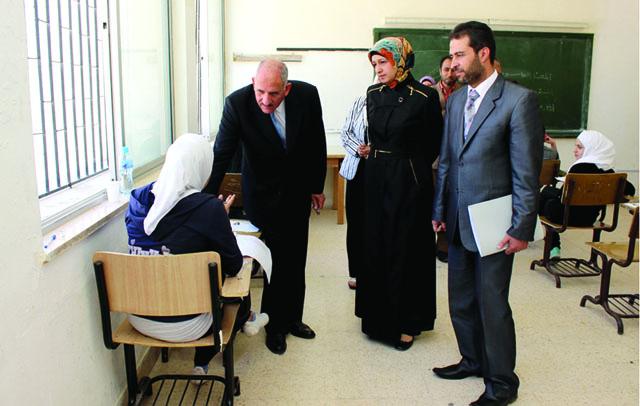You are here
Tawjihi summer session concludes with ‘marked’ drop in violations
By Dana Al Emam - Jun 29,2014 - Last updated at Jun 29,2014

AMMAN — The General Secondary Education Certificate Examination (Tawjihi) summer session concluded on Sunday with a “remarkable” decrease in violations, according to Education Ministry Spokesperson Walid Jallad.
“Until Saturday evening around 2,700 violations were recorded, while they amounted to 6,000 during the winter session,” Jallad told The Jordan Times in a telephone interview.
He attributed the drop in violations to “strict technical and administrative measures” taken by the ministry, in addition to the cooperation of security forces and the awareness of students and parents.
The number of schools with examination halls was reduced from 1,640 in the last summer session to 422 this year, Jallad said, adding that this measure helped maintain order during examinations and cut down expenses.
“Tawjihi exams cost around JD26 million annually, but this year the cost is expected to drop by half,” he said, noting that this session witnessed no question leaks.
In addition, the session was “compressed into 14 days instead of the usual 22 days to maintain discipline,” Jallad said, adding that 10 minutes were added to the duration of all exams to make students more comfortable.
The ministry’s operations room was open for notes and feedback, not just for questions as usual, to ensure the success of the summer session, which began on June 14, according to the official.
Jallad noted that the ministry has not yet set a date for the results, and cannot do so until the correction process is over.
“The ministry has finished correcting the English and computer courses exam papers,” he said, adding that the correction process during Ramadan will be from 9am until 5pm.
A total of 126,773 students had registered to sit for the Tawjihi summer session, for which the ministry tasked 13,000 teachers to supervise the exams and 18,566 to correct the papers.
The registered students included 92 inmates at correctional and rehabilitation centres and 367 students with different disabilities.
Students’ score in the Tawjihi decides their future in higher education. It is the main criterion to determine whether they are qualified to go to university, which public university they can enrol at and which specialty in which they can major.
Related Articles
The Ministry of Education on Saturday called on students who sat for the General Secondary Certificate Examination (Tawjihi) to "disregard" any sources that claim they will announce its results before they are officially issued by the ministry.
The Education Ministry plans to include the measures it applied to maintain order and security during the General Secondary Certificate Examination’s (Tawjihi) latest sessions in its regulations, an official said on Sunday.
AMMAN — The General Secondary Education Certificate Examination (Tawjihi) winter session starts today and concludes on January 16, with arou
















